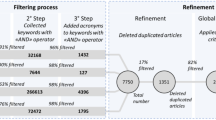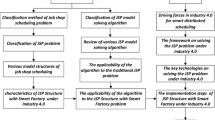Abstract
This paper investigates an integrated production and assembly scheduling problem with the practical manufacturing features of serial batching and the effects of deteriorating and learning. The problem is divided into two stages. During the production stage, there are several semi-product manufacturers who first produce ordered product components in batches, and then these processed components are sent to an assembly manufacturer. During the assembly stage, the assembly manufacturer will further process them on multiple assembly machines, where the product components are assembled into final products. Through mathematical induction, we characterize the structures of the optimal decision rules for the scheduling problem during the production stage, and a scheme is developed to solve this scheduling problem optimally based on the structural properties. Some useful lemmas are proposed for the scheduling problem during the assembly stage, and a heuristic algorithm is developed to eliminate the inappropriate schedules and enhance the solution quality. We then prove that the investigated problem is NP-hard. Motivated by this complexity result, we present a less-is-more-approach-based variable neighborhood search heuristic to obtain the approximately optimal solution for the problem. The computational experiments indicate that our designed LIMA-VNS (less is more approach–variable neighborhood search) has an advantage over other metaheuristics in terms of converge speed, solution quality, and robustness, especially for large-scale problems.





Similar content being viewed by others
References
Ahmadizar, F., & Farhadi, S. (2015). Single-machine batch delivery scheduling with job release dates, due windows and earliness, tardiness, holding and delivery costs. Computers & Operations Research, 53, 194–205.
Alam, T., & Raza, Z. (2018). A bacterial foraging-based batch scheduling model for distributed systems. International Journal of Bio-Inspired Computation, 11(1), 16–26.
Allahverdi, A., & Al-Anzi, F. S. (2006). Evolutionary heuristics and an algorithm for the two-stage assembly scheduling problem to minimize makespan with setup times. International Journal of Production Research, 44(22), 4713–4735.
Azzouz, A., Ennigrou, M., & Ben Said, L. (2018). Scheduling problems under learning effects: Classification and cartography. International Journal of Production Research, 56(4), 1642–1661.
Bouffard, V., & Ferland, J. A. (2007). Improving simulated annealing with variable neighborhood search to solve the resource-constrained scheduling problem. Journal of Scheduling, 10(6), 375–386.
BoussaïD, I., Lepagnot, J., & Siarry, P. (2013). A survey on optimization metaheuristics. Information Sciences, 237, 82–117.
Chen, J. C., Chen, Y. Y., Chen, T. L., & Lin, J. Z. (2017). Comparison of simulated annealing and tabu-search algorithms in advanced planning and scheduling systems for TFT-LCD colour filter fabs. International Journal of Computer Integrated Manufacturing, 30(6), 516–534.
Cheng, T. E., Hsu, C. J., Huang, Y. C., & Lee, W. C. (2011). Single-machine scheduling with deteriorating jobs and setup times to minimize the maximum tardiness. Computers & Operations Research, 38(12), 1760–1765.
Cheng, T. E., Lai, P. J., Wu, C. C., & Lee, W. C. (2009). Single-machine scheduling with sum-of-logarithm-processing-times-based learning considerations. Information Sciences, 179(18), 3127–3135.
Coffman, E. G., Jr., Garey, M. R., & Johnson, D. S. (1978). An application of bin-packing to multiprocessor scheduling. SIAM Journal on Computing, 7(1), 1–17.
Costa, L. R., Aloise, D., & Mladenović, N. (2017). Less is more: Basic variable neighborhood search heuristic for balanced minimum sum-of-squares clustering. Information Sciences, 415, 247–253.
El-Yaakoubi, A., El-Fallahi, A., Cherkaoui, M., & Hamzaoui, M. R. (2017). Tabu search and memetic algorithms for a real scheduling and routing problem. Logistics Research, 10(7), 1–18.
Fan, W., Pei, J., Liu, X., Pardalos, P. M., & Kong, M. (2018). Serial-batching group scheduling with release times and the combined effects of deterioration and truncated job-dependent learning. Journal of Global Optimization, 71(1), 147–163.
Framinan, J. M., Perez-Gonzalez, P., & Fernandez-Viagas, V. (2019). Deterministic assembly scheduling problems: A review and classification of concurrent-type scheduling models and solution procedures. European Journal of Operational Research, 273(2), 401–417.
Fu, Y., Ding, J., Wang, H., & Wang, J. (2018). Two-objective stochastic flow-shop scheduling with deteriorating and learning effect in Industry 4.0-based manufacturing system. Applied Soft Computing, 68, 847–855.
Gawiejnowicz, S. (2008). Time-dependent scheduling. Berlin: Springer.
Hariri, A. M. A., & Potts, C. N. (1997). A branch and bound algorithm for the two-stage assembly scheduling problem. European Journal of Operational Research, 103(3), 547–556.
Jia, J., & Mason, S. J. (2009). Semiconductor manufacturing scheduling of jobs containing multiple orders on identical parallel machines. International Journal of Production Research, 47(10), 2565–2585.
Kress, D., Barketau, M., & Pesch, E. (2018). Single-machine batch scheduling to minimize the total setup cost in the presence of deadlines. Journal of Scheduling, 21(6), 595–606.
Liao, C. J., Lee, C. H., & Lee, H. C. (2015). An efficient heuristic for a two-stage assembly scheduling problem with batch setup times to minimize makespan. Computers & Industrial Engineering, 88, 317–325.
Liu, P., Yi, N., Zhou, X., & Gong, H. (2013). Scheduling two agents with sum-of-processing-times-based deterioration on a single machine. Applied Mathematics and Computation, 219(17), 8848–8855.
Lu, S., Liu, X., Pei, J., Thai, M. T., & Pardalos, P. M. (2018). A hybrid ABC-TS algorithm for the unrelated parallel-batching machines scheduling problem with deteriorating jobs and maintenance activity. Applied Soft Computing, 66, 168–182.
Luo, J., Liu, Z., & Xing, K. (2018). Hybrid branch and bound algorithms for the two-stage assembly scheduling problem with separated setup times. International Journal of Production Research, 57, 1–15.
Mladenović, N., & Hansen, P. (1997). Variable neighborhood search. Computers & Operations Research, 24(11), 1097–1100.
Mladenović, N., Todosijević, R., & Urošević, D. (2016). Less is more: Basic variable neighborhood search for minimum differential dispersion problem. Information Sciences, 326, 160–171.
Mor, B., & Mosheiov, G. (2011). Single machine batch scheduling with two competing agents to minimize total flowtime. European Journal of Operational Research, 215(3), 524–531.
Pei, J., Liu, X., Pardalos, P. M., Migdalas, A., & Yang, S. (2017). Serial-batching scheduling with time-dependent setup time and effects of deterioration and learning on a single-machine. Journal of Global Optimization, 67(1–2), 251–262.
Potts, C. N., Sevast’Janov, S. V., Strusevich, V. A., Van Wassenhove, L. N., & Zwaneveld, C. M. (1995). The two-stage assembly scheduling problem: Complexity and approximation. Operations Research, 43(2), 346–355.
Renna, P., & Perrone, G. (2015). Order allocation in a multiple suppliers-manufacturers environment within a dynamic cluster. The International Journal of Advanced Manufacturing Technology, 80(1–4), 171–182.
Roh, J., Hong, P., & Min, H. (2014). Implementation of a responsive supply chain strategy in global complexity: The case of manufacturing firms. International Journal of Production Economics, 147, 198–210.
Roshanaei, V., Naderi, B., Jolai, F., & Khalili, M. (2009). A variable neighborhood search for job shop scheduling with set-up times to minimize makespan. Future Generation Computer Systems, 25(6), 654–661.
Shahvari, O., & Logendran, R. (2018). A comparison of two stage-based hybrid algorithms for a batch scheduling problem in hybrid flow shop with learning effect. International Journal of Production Economics, 195, 227–248.
Shokrollahpour, E., Zandieh, M., & Dorri, B. (2011). A novel imperialist competitive algorithm for bi-criteria scheduling of the assembly flowshop problem. International Journal of Production Research, 49(11), 3087–3103.
Tao, F., Cheng, Y., Zhang, L., & Nee, A. Y. (2017). Advanced manufacturing systems: Socialization characteristics and trends. Journal of Intelligent Manufacturing, 28(5), 1079–1094.
Wang, J. B. (2007). Single-machine scheduling problems with the effects of learning and deterioration. Omega, 35(4), 397–402.
Wang, X., & Cheng, T. E. (2007). Single-machine scheduling with deteriorating jobs and learning effects to minimize the makespan. European Journal of Operational Research, 178(1), 57–70.
Wang, J. B., Liu, M., Yin, N., & Ji, P. (2017). Scheduling jobs with controllable processing time, truncated job-dependent learning and deterioration effects. Journal of Industrial & Management Optimization, 13(2), 1025–1039.
Wen, Y., Xu, H., & Yang, J. (2011). A heuristic-based hybrid genetic-variable neighborhood search algorithm for task scheduling in heterogeneous multiprocessor system. Information Sciences, 181(3), 567–581.
Wu, C. C., Wang, D. J., Cheng, S. R., Chung, I. H., & Lin, W. C. (2018). A two-stage three-machine assembly scheduling problem with a position-based learning effect. International Journal of Production Research, 56(9), 3064–3079.
Yang, S., Wang, J., Shi, L., Tan, Y., & Qiao, F. (2018). Engineering management for high-end equipment intelligent manufacturing. Frontiers of Engineering Management, 5(4), 420–450.
Yin, Y., Cheng, T. C. E., Hsu, C. J., & Wu, C. C. (2013). Single-machine batch delivery scheduling with an assignable common due window. Omega, 41(2), 216–225.
Yin, Y., Cheng, T. C. E., Wang, D., & Wu, C. C. (2015). Improved algorithms for single-machine serial-batch scheduling with rejection to minimize total completion time and total rejection cost. IEEE Transactions on Systems, Man, and Cybernetics: Systems, 46(11), 1578–1588.
Yin, Y., Wang, Y., Cheng, T. C. E., Liu, W., & Li, J. (2017). Parallel-machine scheduling of deteriorating jobs with potential machine disruptions. Omega, 69, 17–28.
Yin, Y., Wang, Y., Cheng, T. C. E., Wang, D. J., & Wu, C. C. (2016). Two-agent single-machine scheduling to minimize the batch delivery cost. Computers & Industrial Engineering, 92, 16–30.
Yin, Y., Yang, Y., Wang, D., Cheng, T. C. E., & Wu, C. C. (2018). Integrated production, inventory, and batch delivery scheduling with due date assignment and two competing agents. Naval Research Logistics (NRL), 65(5), 393–409.
Zhang, B., Pan, Q. K., Gao, L., & Zhang, X. L. (2018). A hybrid variable neighborhood search algorithm for the hot rolling batch scheduling problem in compact strip production. Computers & Industrial Engineering, 116, 22–36.
Acknowledgements
This work was supported by the National Natural Science Foundation of China (Nos. 71871080, 71601065, 71231004, 71690235, 71501058, 71601060, 71922009), and Innovative Research Groups of the National Natural Science Foundation of China (71521001), the Humanities and Social Sciences Foundation of the Chinese Ministry of Education (No. 15YJC630097), and Base of Introducing Talents of Discipline to Universities for Optimization and Decision-making in the Manufacturing Process of Complex Product (111 project).
Author information
Authors and Affiliations
Corresponding authors
Additional information
Publisher's Note
Springer Nature remains neutral with regard to jurisdictional claims in published maps and institutional affiliations.
Rights and permissions
About this article
Cite this article
Lu, S., Pei, J., Liu, X. et al. Less is more: variable neighborhood search for integrated production and assembly in smart manufacturing. J Sched 23, 649–664 (2020). https://doi.org/10.1007/s10951-019-00619-5
Published:
Issue Date:
DOI: https://doi.org/10.1007/s10951-019-00619-5




